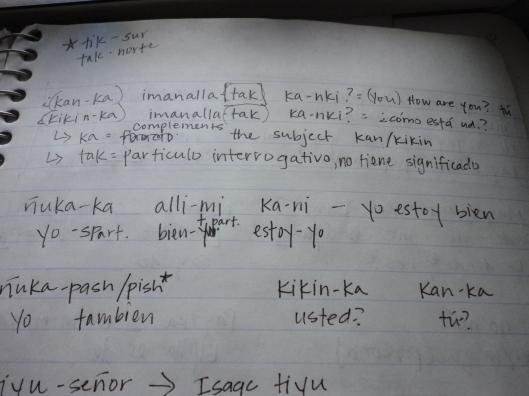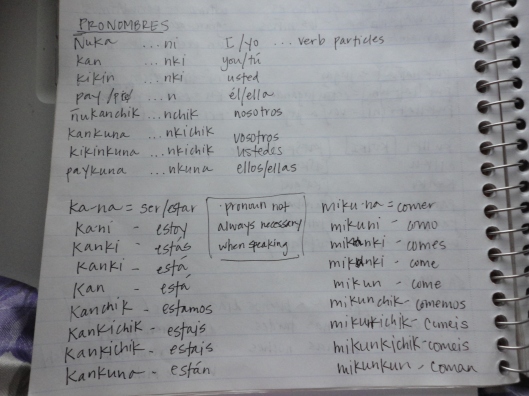I realize only about .02% of the world population is interested in anything related to Kichwa or any other obscure language, but I happen to be one of those people that is completely fascinated in the randomness of it all. However given the fact that I still know almost nothing about Kichwa, this probably won’t be that interesting to those .02%. Just a fair warning.
As stated in my previous post, I have about 2 1/2 weeks before I move permanently to my home for the next two years. Saquisilí is located 2 1/2 hours south of Quito in the province of Cotopaxi. Due to its central location high up in the Andes mountains, there is a sizable indigenous Kichwa population. When I got the basic stats on the high school I’ll be working in, I was told that 35% of the students speak Kichwa. 35% doesn’t seem like a lot plus all the kids speak Spanish at school soooooo the probability of me actually learning Kichwa is pretty slim. Nonetheless, because the Peace Corps is the Peace Corps, I started Kichwa classes last week with 5 other trainees who’s Spanish is too advanced to be sitting through more classes on the intricacies of Ecuadorian Spanish and/or are headed to sites where they might hear Kichwa in the markets, walking through the countryside, etc. Still not really sure how I fit into all of that.
Kichwa 101:
- The difference between Quichua and Kichwa is simply orthographic. Before the Spanish conquistadors, there was no writing system for the language so both spellings are correct. (Note: I haven’t seen Quichua anywhere…it’s always Kichwa.)
- Kichwa refers to the varieties of Quechua spoken in Colombia & Ecuador. The Quechua Americans think of is mostly spoken in Peru and Bolivia.
- According to Wikipedia (:)), the Quechua language family is as diverse as Arabic. Think Moroccan Arabic vs. Gulf Arabic…different in vocabulary and structure but each can be understood by the other speaker.
- Pronunciation is very similar to Japanese. Seems very obvious as to why but was still a little surprising when I first heard it.
- The language is agglutinative meaning what it lacks in grammatical exceptions (think about all the rule breaking in English) it makes up for in the shear amount of affixes…1.2 million (that’s a guess but I may actually be correct) that you can add to a word to make it mean anything from a past tense verb to an adjective to a noun to a question.
- Example: wawa = boy / wawaka = the boy / wawakuna = the boy is / wawakunaka = the boys
I eat this stuff up. I don’t think I have the ability to pick up languages and fluently communicate but I’m always fascinated in the structure and origins of languages. Although I should be concentrating on remembering how to introduce myself to the old Kichwa people in Saquisilí, I find myself analyzing particles and object markers. Nerd. Alert. After a week of classes, I have 7 pages of Kichwa with Spanglish explanations that look more like notes from the Field Methods Linguistics class I took my last semester of college than like a concise list of useful phrases. We’ll swap a random African language for a random South American language, Dr. Carstens would be proud. I’ve resigned myself to the fact that, after my two year stint in the Andes mountains, I probably won’t be able to say more than “Good morning, my name is Catherine. See you later.”/”Alli puncha, ñukaka Catherinemi kani. Ashtakashkama.” (for anyone dying to know.) Así es la vida as they say in Spanish. Then again maybe my next post will be in Kichwa. Yeah right.
 The beginnings of another final capstone paper? “Object Marking in
The beginnings of another final capstone paper? “Object Marking in Kinyaturu Kichwa” Yeah probably not.
All that being said, here are some phrases I wrote down in case you find yourself needing to suck up to a market vendor in the Andes or you just need small talk for your next cocktail party.
Useful Phrases (Week 1)
- Imanalla = Hi
- Alli puncha = Good morning
- Alli chishi = Good afternoon
- Alli tuta = Good night
- Yupaychani = Thank you
- Ari = Yes
- Mana = No
- ¿Kikinka imanallatak kanki? = How are you?
- Ñukaka allimi kani. = I’m fine.
- ¿Ima stutitak kanki? = What’s your name?
- Ñukaka ____mi kani. = My name is ____.
- ¿Maymantatak kanki? = Where are you from?
- Ñukaka ____mantami kani. = I’m from ____.
- Kayakama(n) = See you tomorrow
- Ashtakashkama(n) = See you later
Cheers/Saludos to everyone, alli tuta!


Love you nerd! Its good that this is something you enjoy doing that isn’t for a class. If it was something you were learning for a class, you would probably be too busy not studying with me to ever learn it.
Quite interesting, to say the very least! Enjoyed reading your post! I was a PCV in Santo Domingo from 1980-1981.
Hola Catalina
I am looking for a Quichua name for a boy and read your post. I am from Ecuador and wish I knew more about my ancestors language. My husband was in the PC 68 to 70, that is how I ended up in the USA, Michigan.
I wish you the best, you have the right attitude.
Wondering if you´re still in Saquislí. I was a priest for several years in Quito and Tena.
Pingback: “Linguistic Dimensions of Language Contact”- In the Andes | Ponder SLHS
I Love it! I am writing my master’s dissertation about intercultural education and I ended up with this post. I’m from Ecuador living in London. I wish I knew more about kichwa. Regresaré pronto a Ecuador y cada vez me convenzo más de que quiero aprender el idioma.
I just want to thank you for writing this article. Good luck while you experience a different culture. Don’t forget to visit Salinas or playas you will enjoy these cities. Daniel
I’m going to Ecuador on a ‘dental vacation’, and this post could have been written by me! Did you end up learning Kichwa? If/when you went to Cusco, could they understand your Kichwa?
I actually never used any Kichwa while in Ecuador and only learned the very basics. It was interesting to have a brief introduction to it though. I would hear it on the radio sometimes and some of the students I worked with spoke it at home and sometimes to each other at school. In Cusco, they actually speak Quechua which is closely related to Kichwa but not exactly the same. (Colombia/Ecuador = Kichwa, Peru/Bolivia = Quechua) Good luck on your trip!